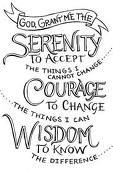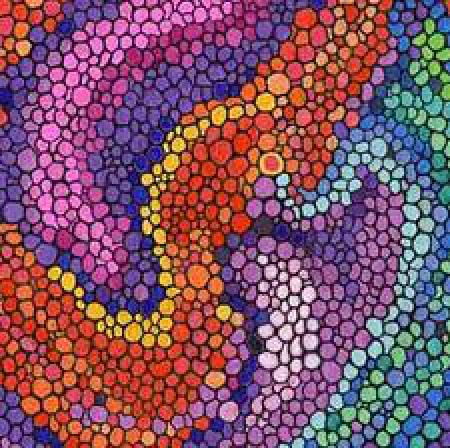Serendip is an independent site partnering with faculty at multiple colleges and universities around the world. Happy exploring!
KT's blog

Wisdom, Serenity and Free Will Revisited

Is life a series of choices or is it predetermined? How each of us addresses this question is key to our understanding of life, our purpose and our happiness. If you feel that you have free will, you feel agency and an ability to impact the behavior of yourself and others and to choose a direction for the events in your life. But is it a binary, are the two possibilities complete free will or complete determinism? In this paper I would like to investigate how they work together. I think that many of us believe that we have free will but then make choices based on determinism. Why do we behave in this way, how can we change it and what would the impact be?

Final Performance - Sundown on Lit Kinds 2012
Lit Kinds Song (Tune of Sundown By Gordon Lightfoot)
Chorus:
Lit Kinds, I think it’s a shame if you don’t know fact from fiction how can truth be explained.
Lit Kinds I’m going insane ‘cause I realize our perceptions are never the same.
Verse:
Digital Humanities are moving along now you don’t need a doctorate to survey what’s going on.
Verse:
Then Price came to visit said she’s open to things and if we laid down on the floor it wouldn’t bother a thing.
Chorus
Verse:
When you’re struggling with the difference essay, story or life, start with definitions it might bring it to light.
Verse:
Then we’re talking about breaking and those kind of things but some don’t like when teachers share personal things.
Chorus
Verse:
Now we start with a discussion of a title’s name and if you don’t really get it better read closer in.
Verse:
We’re working on the board, which we don’t really like, let’s just talk in our seats I think that’ll be alright.
Chorus
Verse:
(War of the) Worlds was really different on the radio
Wells tried to trick us, Was that nice? (Yo!)
Verse:
Then we’re filling out our evals, Our letters to Anne
Every question had genre so confusion set in.

Wisdom, Serenity and Free Will
In Slaughterhouse-5, Vonnegut presents us with Billy Pilgrim, a man who was subject to all of war’s physical destruction and mental hollowing. Throughout the novel, Pilgrim wonders through in acceptance of all of the situations that are presented to him. He readily allows himself to be kidnapped by Aliens, he accepts when he will die and he accepts that he is in war. Despite the main character’s acquiescence, Vonnegut displays the Serenity prayer in the novel, a mantra of free will:
God grant me the serenity to accept the things I cannot change, courage to change the things I can, and the wisdom always to tell the difference.

Does Billy (or do any of us) have the ability to follow this advice? The Trafalmadorians only follow the first phrase, acceptance, but Earthlings believe that we have the agency in all of these phrases. Is Vonnegut suggesting that Billy does have free will and that we can choose not to have war?
To explore this theme, I’d like to look at the contrast between the Trafalmadorian view of agency versus the Earthling view. The Trafalmadorians believe that the idea of free will is exclusive to those on Earth:

Serenity Post
When I read dglasser’s post on stoicism and Alicia’s post on free will, I can’t help but think about the insertion of the Serenity Prayer in the locket around Montana Wildhack’s neck:
God grant me the serenity to accept the things I cannot change, courage to change the things I can, and the wisdom always to tell the difference.
Part of the prayer is stoic in accepting the things that you cannot change and part of it believes in free will in that it encourages taking action and making a change. Hmmm.
It’s a common prayer/mantra for people in AA and the other side of the locket has Montana’s alcoholic mother, so it makes me wonder what alcoholics have in common with the state of mind of the characters in this book.
Should this prayer be taken at face value that we do have free will and we can make a choice (how to live, whether or not to drink)? Is it meant to be ironic since Billy and Montana are merely following along in the life that the Trafalmadorians have created for them in the same way that an alcoholic may not want to drink but at times they do so anyway – it’s just the way the moment was structured?
I think the heart of the prayer has to do with the “wisdom to tell the difference,” but how do we do that? Is war inevitable and something that we need to accept or is it something that we can change?

Why is Truth Important?
Once again this week, I find myself inspired by Kobieta. (I hope you don’t think I’m picking on you since I often comment on your thoughts, I just find that you inspire me to think further about the questions that you raise.)
In class, Kobieta asked why is the truth important? I think many of us can look at the issue of truth and find that there are many truths, not one, and that they are dependent on how we interpret a situation. Certainly our memories seem true, but after listening to the radio lab, we learned that we reinvent our memories each time they are recalled, so maybe they are not true. And since we all have different perspectives, we see different truths in the same experience (i.e. we all hear the same words in class but may not agree on how to interpret them, what they mean or what the implication is.) So if 100% truth doesn’t exist, then how could it be important?
I think what’s important about the truth is its potential. The truth allows us to make predictions and provides us with certain expectations about outcomes. The truth is defined as something that has a basis as a fact or belief that is commonly accepted, so if everyone is on the same page (i.e. we have common agreement on the truth) then we can make decisions based on predictable facts. Even if we can’t agree on the truth either within ourselves or with others, I think it’s important to strive for it in order to make better sense of our world and how we choose to interact with it.

Taking a Different Road: How Does Form Change Content?
In Understanding Comics, Scott McCloud makes a point to distinguish form from content. Comics have been traditionally thought of as superhero picture books for an immature audience. More recently, however, comics have grown up. Much as a child might transition from being called Jimmy to James as an adult, now the comic is the graphic novel and its form is being utilized address more serious themes. But what is the effect? How does this format alter the content or the way in which we interpret the material?
A new space:
One of the outcomes derives from the stereotype of comics themselves. To take a very serious issue of a country and its people in turmoil, as Satrapi does in Persepolis, and place it in a historically child-like format alters the space in which our perceptions and interpretations of the novel are formed. It invites the reader into the more basic level of reasoning that we used as children, an exploration of content from a different but formerly familiar place. In the same way that you might reminisce about your younger days when visiting your old elementary school, maybe we are being asked to reminisce about the way we used to think about the world when we’re placed in this youthful space versus the space in a very adult-like piece of literature.


CIRCLES AND LINES: WRITING RECONCEIVED
"no longer the sole producers, stewards, and disseminators of knowledge or culture, universities are called upon to shape natively digital models of scholarly discourse for the newly emergent public spheres of the present era." (1)
As the information age has taken hold, thoughts, views and writings have gained a wider realm of dissemination than ever before. The internet and its databases have provided the knowledge of those who came before to all and any without a filter or intermediary. Thoughts and ideas are presented through an open door for all to enter and interact. The results of this openness have enacted many changes in all that we think and do, especially in the Digital Humanities. The antiquated idea that a writer constructs her writing as “original” and as an individualized piece of work is being challenged by the overwhelming flow and mixing of ideas by anyone and everyone. The idea of the individual owning a deed to an idea is being replaced by a common space occupied by all. In “The Geography of Thought,” Nisbett delineates the differences between Western individualist thinking and East Asian collective. It is in this light that I’d like to examine our traditional process of “original” writing, explore how the Digital Humanities is reconceiving that concept to a more collective framework and how this might change the landscape.


LITERARY ENTROPY
I was thinking about our readings and discussion this week and was reminded of the laws of thermodynamics (i.e. the energy of the universe is constant and the entropy of the universe is increasing). It seems like these principles also apply to the creation of new genres and academic writing too.
In terms of the infinite regress of source materials, perhaps they are the conserved “energy” and all of our different interpretations and changes that we apply to these conserved sources serve to combine but, in doing so, spread out the sources into something “new”… a unique combination. I think the idea of wanting to produce something that’s different, in any form that it may take (write, draw, describe) are all ways of taking a finite source and expanding out to something infinite.
With the ability to reference so many sources on the internet, our ability to combine, but expand, has increased profoundly. The internet opens our window to new languages, stories, tones of voice, categories of knowledge, graphic representations, interactions, as well as things we’re not even seeking to find (i.e. the surprises that may come up when you Google). Since you can make many more variants from 100 sources than 5, for example, all of these aspects can make for even greater diversity and boundless creativity. As the universe is increasing, so are our literary kinds.


